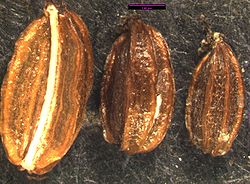Ligusticum apiifolium
Common name: cerlery leaved lovage or celeryleaf licorice-root
Abbreviation code (Codon): LIAP
Contents
Taxonomy
- Kingdom: Plantae – Plants
- Subkingdom: Tracheobionta – Vascular plants
- Superdivision: Spermatophyta – Seed plants
- Division: Magnoliophyta – Flowering plants
- Class: Magnoliopsida – Dicotyledons
- Subclass: - Magnoliidae
- Order: Apiales
- Family: Apiaceae/Umbelliaceae- Carrot family
- Genus: Ligusticum
- Species: apiifolium
Discription
General: Stout perennial herb from a thick taproot; stems 50-120 cm tall, branching, glabrous, leafy with fibrous remains of leaf sheaths at the base.
Leaves: Compound, mostly basal, divided into distinct toothed leaflets up to 5 cm long; stem leaves reduced but at least 1 fairly well-developed.
Flowers: Inflorescence of compound umbels, rays 12-30, 2.5-6 cm. long; involucre and involucels wanting; calyx teeth obscure; petals five, white.
Fruits: Oblong to elliptic, 4-5 mm long, glabrous, with narrowly winged ribs.
Bloom Period
Distribution
West of the Cascades, Washington to central California.
Habitat
Moist stream banks, slopes and meadows in the mountain zone
Uses
Karok Drug (Dietary Aid) - Infusion of roots taken by person who lacks an appetite. Pomo Drug (Antihemorrhagic) - Decoction of roots taken for lung hemorrhages. Pomo, Kashaya Drug (Blood Medicine) - Decoction of root taken for anemia. Pomo, Kashaya Drug (Tuberculosis Remedy) - Decoction of root taken for the beginning of tuberculosis.
Propagation
Photo Gallery
References
http://biology.burke.washington.edu/herbarium/imagecollection.php http://herb.umd.umich.edu/herb/search.pl
Seed
Abbreviation: LIAP
Seed sample from: 2011
Average Measurement: 4.5 x 2.1 x 1.4
Measurement Range: L: 4 – 5, W: 2 – 2.5, D: 1 – 2
Features
Shapes: Seeds have two distinct seed faces. One side is more flattened or concave, and the other is more convex. Hilum tapered, opposite apex rounded. Color: Entire seed several shades of brown.
Surface: One seed face has several distinct ridges running longitudinally from hilum to opposite apex. The other seed face has one longitudinal white line running from hilum to opposite apex. Seeds sometimes wrinkled or slightly bumpy, and somewhat lustrous.


